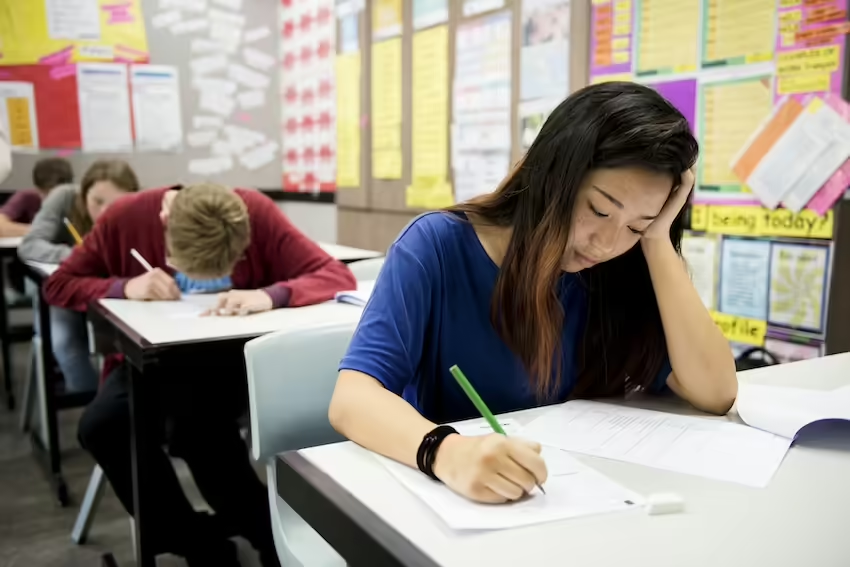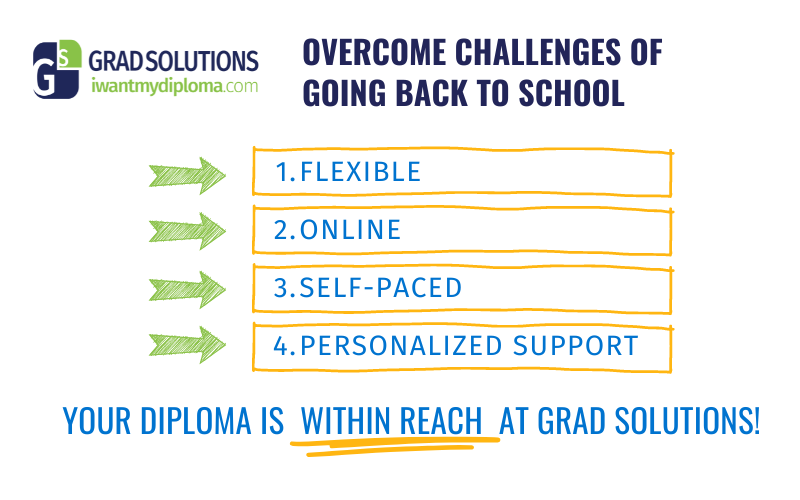Online School
Why Teens Hate School: Insights and Solutions for Parents

It’s possible that your teen doesn’t dislike school as much as this student, but the reality is, they likely have a negative view of school. While your teen may tolerate school, it’s no secret that most teens would rather play video games than attend classes.
In a 2020 United States survey, seventy-five percent of students reported negative feelings about school. The survey results point to common feelings of tiredness, stress, and boredom at school. If that data isn’t surprising enough, parents should be aware that these intense negative feelings are known to diminish cognitive resources and negatively impact school performance and academic achievement as witnessed the first time during the COVID-19 response.

Common Reasons Why Teens Dislike School
For older kids and teens, school is an integral part of their childhood, but not all students feel good about it. Some teens still enjoy socializing with peers, while others find school creates anxiety and dread.
Understanding the main reasons why teens want to withdraw from school can help parents create a more supportive and engaging educational environment. Here are some common reasons why teens might dislike school:
Academic Pressure
The pressure to perform well academically can be overwhelming for many students. High expectations from parents, teachers, and the students themselves can lead to stress and anxiety. This pressure often results in a fear of failure, making school a source of constant worry rather than a place of learning and growth.
Social and Emotional Challenges
Children dealing with social or emotional challenges, such as issues at home, mental health concerns, or social anxiety, may find it nearly impossible to focus in school. These students may struggle to concentrate on their studies or participate in school activities, making the school experience less enjoyable and more daunting.
Learning Disabilities
Students with learning disabilities or those struggling with certain subjects may feel frustrated and discouraged. Many do not stand out as candidates for an IEP or 504 plan but have trouble learning in certain areas. If these students do not receive the support they need, they can fall behind their peers, leading to a negative self-image and a dislike for school. Identifying and addressing these difficulties is crucial for fostering a positive educational experience.
Bullying and Peer Pressure
Bullying is a significant issue in many school districts. Any student can become a victim of bullying, which affects teens from all backgrounds. Victims of bullying may dread going to school the next day, fearing encounters with their tormentors at lunch time, on the bus, or even in classes.
Teacher-Student Relationships
While typically not the only reason students drop out, the relationship between teachers and students is vital to a child’s attitude toward school. Positive relationships can inspire and motivate students, while negative interactions can lead to resentment and disengagement. Empathetic, supportive, and enthusiastic teachers can significantly affect how students perceive school and the overall learning experience.
Rigid Schedules and Lack of Adequate Sleep
The structured environment of school, with its rigid schedules and limited autonomy, can be stifling for some students. Recent research has shown that teens need at least 9-10 hours of sleep per night but most only get 6.5-7.5 due to school schedules. Due to hormonal changes in teens’ internal clocks naturally shift forward 1-2 hours. This makes them feel sleepy later in the morning.
Personal Challenges & Financial Stress
Financial struggles can profoundly affect a teenager’s mental and emotional well-being, leading to significant anxiety and stress. When a family faces financial difficulties, a teen may feel the pressure to contribute financially, worry about the stability of their home, or be concerned about their future prospects. This constant stress can become overwhelming, making it hard for them to focus on classroom activities.
The fear of not being able to afford college or the basic necessities of public education can dominate their thoughts and lead to difficulty concentrating lower academic performance, and a lack of motivation.
Addressing the reasons why teens might dislike school requires a non-traditional approach. Schools can be different by creating a supportive and engaging environment that fosters a love of learning. This can be achieved through empathetic teaching, personalized learning approaches, anti-bullying initiatives, and a focus on student well-being.

The Impact of Disliking School
Emotional and Mental Health
Disliking school can negatively affect a student’s overall well-being, influencing various aspects of their life. Persistent negative feelings about school can lead to depression, characterized by feelings of hopelessness, lack of interest in activities, and a general sense of despair.
Academic Consequences
Consistent difficulties with schoolwork and their learning process can make students feel incompetent or unintelligent, leading to a diminished sense of self-worth. A lack of positive reinforcement or negative interactions with teachers can make students’ hard work feel undervalued and unappreciated.
Long-Term Effects
The adverse effects of disliking school can extend beyond the school years into the real world. It can affect their feelings toward education for the rest of their lives. A negative attitude towards school can result in poor academic performance, higher dropout rates, and lower levels of educational attainment. Lower educational achievement can lower confidence and limit career opportunities and earning potential, impacting long-term financial stability and job satisfaction.
Lack of Real World Skills
Lastly, critical thinking skills, social skills, and relationships with school friends and mentors formed during school years are crucial for future personal and professional interactions. It can also diminish their ability to collaborate and work with others effectively. Poor personal experiences within the education system can hinder the development of these skills.

Tips on Going Back to School After Dropping Out
Returning students often fear failing again, which can lead to significant anxiety and stress. This fear can be a paralyzing thing that hinders their academic performance and social interactions. Additional support can help these students reintegrate into the school environment and be successful. Here are some ways parents can help teens who previously dropped out of high school:
1. Improve Communication with Your Teen
As primary caregivers, it’s your job to support and connect with your teen and listen to them without pressuring them to share. Casual comments about their day are often their way of reaching out, and being open and interested without prying encourages them to share more. Validate their feelings by empathizing rather than trying to solve their problems or downplay their disappointments.
2. Set goals
Together, create a vision for the future and set small and realistic goals as steps to achieve that vision. Building in some milestones and rewards along the way can be great motivators. Knowing what your teen is naturally skilled at and enjoys doing will help you both come up with an attainable future vision.
3. Provide a Strong Support Network
You can support your child from afar by providing mentoring, tutoring, and/or counseling opportunities. Pairing them with a mentor who provides consistent support, encouragement, and guidance. This personal connection helps build confidence and keeps students motivated.
4. School Involvement
Be aware of how your child is progressing in school. Give them autonomy by allowing them to take ownership of their education but be informed about where they are. Communicate with teachers and school administrators as needed and encourage them to participate in extracurricular activities in their free time.

Grad Solutions: a Supportive Alternative for Earning Your Diploma
Grad Solutions offers a promising alternative to traditional education for students who have dropped out of school due to a negative experience. This program is designed to address the unique needs and challenges faced by students who dislike school, providing a supportive and flexible environment to help them complete their education. Here’s how Grad Solutions can be an excellent choice for these students, focusing on key program features:
Flexible – Take Your Time Readjusting
One of the most significant benefits of Grad Solutions is its flexibility. Traditional schools often have rigid schedules that can be overwhelming for students who have been out of the educational system for a while. Grad Solutions allows students to learn at their own pace, taking the time to readjust without the pressure of a fixed timetable. Their flexibility reduces anxiety and enables students to balance their education with other responsibilities, such as work or family commitments.
Fully Remote
Grad Solutions offers a fully remote learning experience, ideal for students who find the traditional school environment overwhelming. By tackling the school day from home or any location with internet access, students can avoid the social issues and distractions that contribute to the negative school experiences of young people. Remote learning also provides a safe space for students to focus on their studies without fear of bullying or peer judgment. Grad Solutions has experience helping students in these circumstances.
Student Resources
These resources ensure that students have everything they need to succeed academically. Genuine care and concern for students’ needs are the foundation of the Grad Solutions program. The team at Grad Solutions works diligently to help students overcome their physical, emotional, and mental barriers so they can then focus on their education.
Our HUB locations are resource centers where students can access physical resources they may need, such as school lunch, beverages, and clothing. In addition, each HUB has community resource specialists who can connect them with community services to meet their specific needs.
Personalized Support
With robust student resources and personalized support through:
Grad Solutions is an alternative for students who have dropped out due to a negative experience in traditional school. Its flexible, fully remote program allows students to learn at their own pace and in their own environment, free from the pressures of conventional schooling.
Learn more about our program here, or enroll your child today!
Resources
How much sleep do teens need? And how to help them get enough
Insufficient sleep in teenagers is associated with overweight and obesity